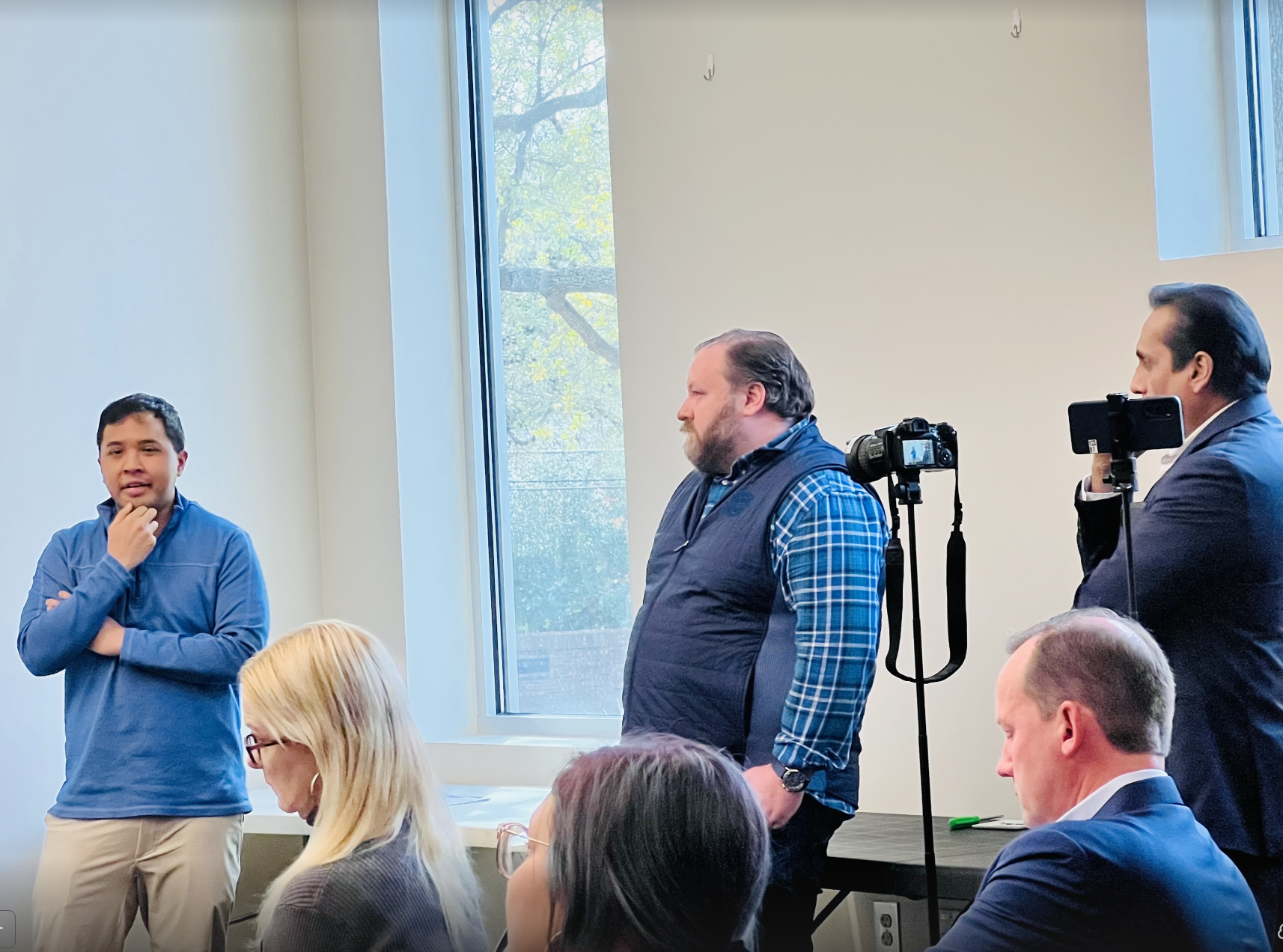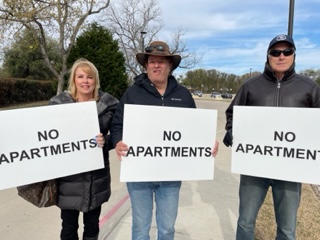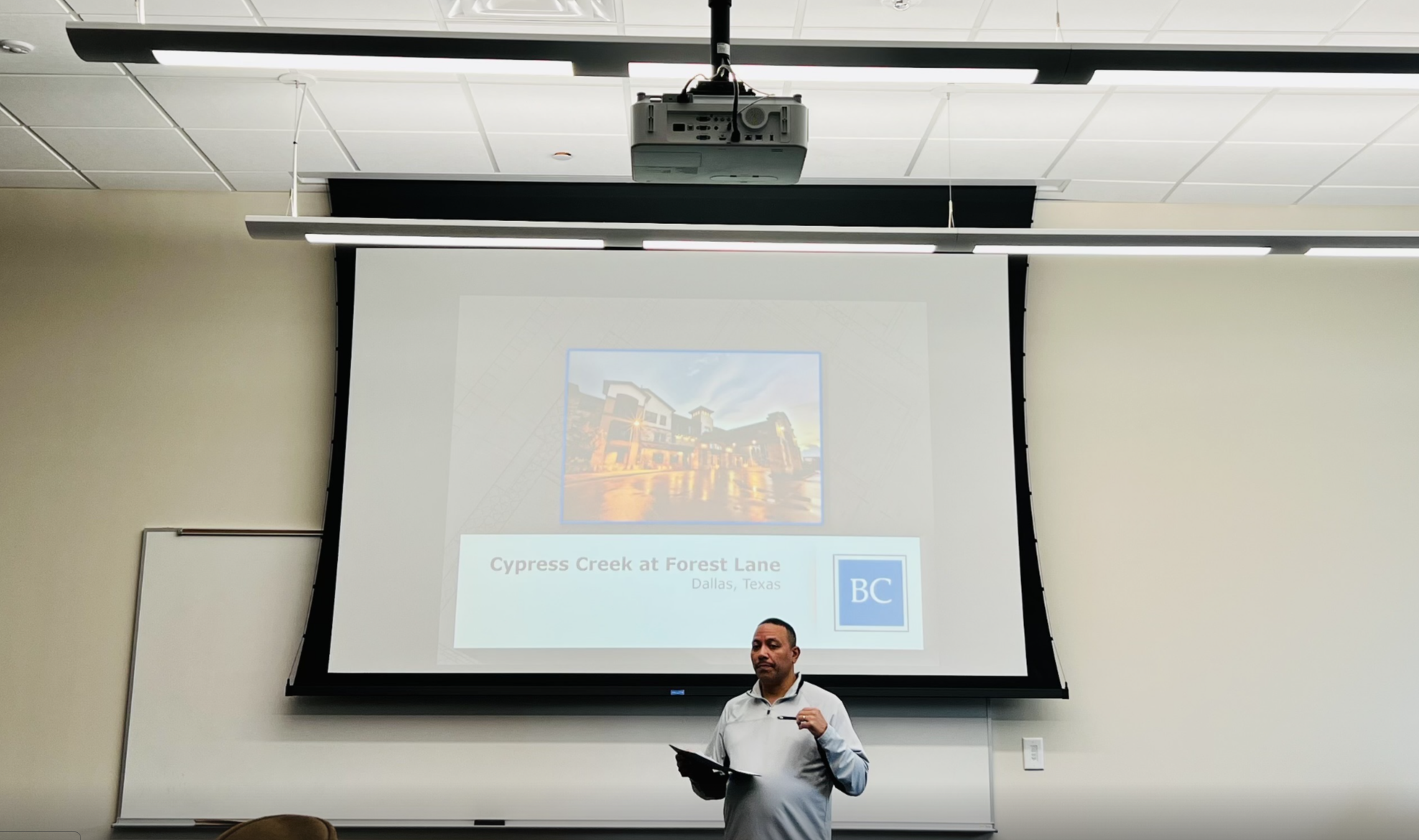
Woot Lervisit, Zachary Krochtengel and a roomful of parties interested in Cypress Creek. Photos by Christina Hughes Babb
The City of Dallas’ Public Facility Corporation earlier this month deferred its decision on Cypress Creek at Forest Lane, a 189 unit affordable housing development at Forest Lane and Central. The board will reconsider the plan next Tuesday, March 28.
After the PFC weighs in on the project, which first came up in 2021, it will go to a Dallas City Council vote.
Despite intense opposition from a number of Lake Highlands residents, council could approve the class A apartment complex with about 109 affordable units and 86 market-rate units, like they did the last time.
Meanwhile, the PFC asked that developers “go back to the community for more discussion and engagement.”
And that’s why some of us spent Saturday morning at the Forest Green Library with Sycamore Strategies developer Zachary Krochtengel and the director of housing and neighborhood revitalization, David Noguera, among others.
Background
To residents who oppose it, Cypress Creek at Forest Lane is like Godzilla. They have fought it, tooth and nail. They were down when the Dallas City Council — notably sans the affirmative vote of Lake Highlands representative Adam McGough — approved the project 13 to 2.
(Traditionally council members go along with the representative of the proposed project’s district, but that’s not the case these days when it comes to housing. Dallas leaders have been struggling since at least 2020 to reduce an affordable housing deficiency of some 87,000 units. So, when this returns to council, expect some council members to vote yes even if McGough votes no.)
But they were not out. They sought the help of State Rep. John Turner D-Dallas, who legally (controversially) advocated against the project. And that’s how they defeated this particular affordable apartment monster.
Or so they thought. As in any horror flick, the beast was gaining strength while they were focused on other things. Now, it’s back. Right in their face. Poised to defeat them. But it’s not over. Because a private 1970s era deed restriction bars the developer from building multifamily housing on the land.
However, if the project goes through the Dallas Public Facility Corporation, a tool cities use to encourage developers, through tax breaks, to build affordable housing, it can override those deed restrictions, Assistant City Manager Majed Al-Ghafry explained in a recent memo.
To be clear, I do not literally think Sycamore Strategies developer Zachary Krochtengel’s proposed mixed-income apartment development is monstrous, nor am I making fun of the villagers who oppose it.
The development is quite necessary say most housing experts. Listen to the KERA story for a broader perspective.
I can grasp frustrations from both sides. I am a longtime Lake Highlands homeowner, I also spent a couple years covering federal housing policy and I gained an understanding of the enormous problem that is housing underproduction. And I have been covering the issue right here in Lake Highlands and other Dallas neighborhoods for double-digit years.
‘Discussion and engagement’
If Saturday morning’s community meeting at the Forest Green Library was any indication, many neighbors are already angry.
Homeowners carried No Apartments signs. One homeowner interrupted a visibly worn-out Krochtengel before he could even finish saying that the project is a low-income housing tax credit development, meaning it already has met requirements set up by Dallas’ Office of Housing and Homelessness Solutions.
“You are the problem, we don’t want you here,” said the man who identified as a longtime Northwood Estates resident. Though he received scattered applause during his several outbursts, and although he garnered the most attention, he is not a formal representative of the neighborhood, as one of his neighbors pointed out.
Commercial property owner William Roth said it was about the deed restriction, which “does not allow apartments on that property,” he said, not a referendum on affordable housing.
Yet others focused less on the deed restrictions than crime, a proliferation of existing apartments and social services and defending the state of diversity in the area.
The proposed Cypress development, Krochtengel said, is along the Central corridor. He says building housing along this and the Tollway corridor is vital for commuters who fall into the affordable-rent range of $1,515 and $2,254 a month depending on the size of the apartment.
“If you look at where the locations of affordable homes in Dallas are, you can basically look right up the middle between the 75 corridor and the North Dallas corridor and there’s no affordable housing, and that’s a shame, and that’s because of decades of purposeful public policy.”
At that, the interrupting attendee stated that his is “one of the most perfectly integrated neighborhoods” in America. He and Krochtengel seemed to misunderstand one another and were talking about different issues. (The Advocate has covered the presence of economic diversity in Lake Highlands. The developer was referring to a broader “affordable housing landscape” of well-documented systemic discrimination in North Dallas.)
District 10 council representative Adam McGough was not there due to a death in his family but issued a recorded statement, essentially saying what he has said before, that he is with his constituents and against developers who “try to circumvent the law and deed restrictions.”
“They found a willing city staff and a willing city manager that would try to push this project through with zero community engagement. The only reason we’re even here now is because the thoughtful members on the PFC finally tapped the brakes.”
Woot Lervisit, a resident who lives near the proposed development, came with a power point presentation outlining his neighborhood’s concerns, which revolve around adherence to deed restrictions, the number of homeless and social services in the area (there are enough, he argues) and the tax credits (that will go into developers’ pockets rather than city coffers).
The director of housing and neighborhood revitalization, David Noguera, was in attendance. He reiterated the need for housing, noting our 7.6 million and growing population
Cypress Creek, unlike the naturally occurring affordable housing in Lake Highlands, would partner with a group called Apartment Life and include social services .
With all the fighting, understanding what, exactly, is happening, might have been challenging. The Advocate’s Carol Toler has been covering this issue, which she recently described as a “twisted pretzel partnership” with the developer, Sycamore, the City of Dallas and the City of Dallas Public Facility Corporation. (She was out of town for the Saturday meeting). And we will continue to do so, beginning with coverage of the March 28 PFC meeting.
2023: About the most recent PFC hearing
2023: An. explanation of the Cypress comeback after we thought it was dead
2021: About State Rep. Turner’s involvement, which ultimately killed the deal the first time around
2021: The City Council approves the development as a LIHTC project in 2021
And here is my 2022 cover story about affordable housing, including an explanation of LIHTC, area median incomes, PFC and other tools the city is utilizing to construct housing in Dallas; interviews with Noguera and other city officials and an overview of housing in Dallas.







